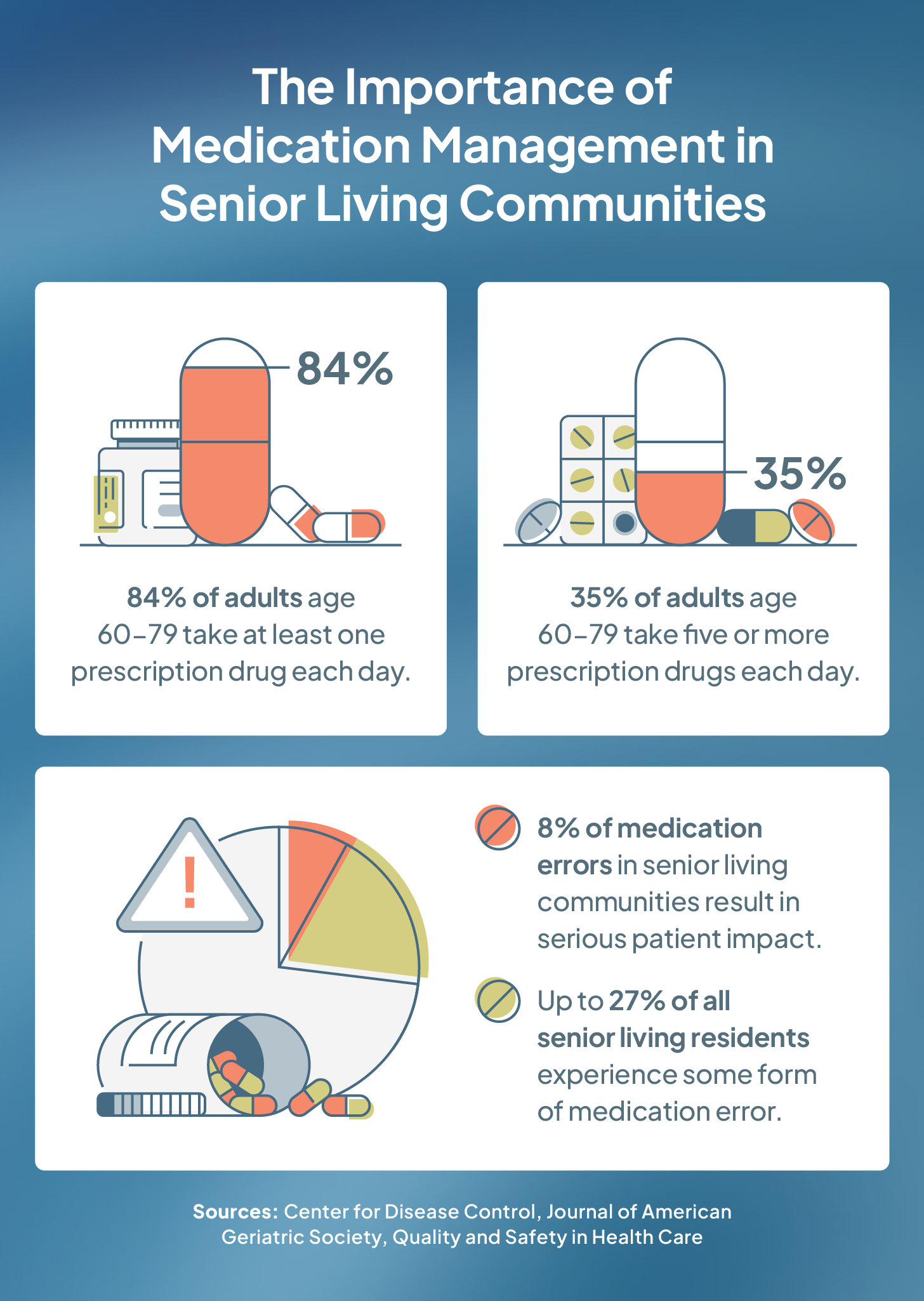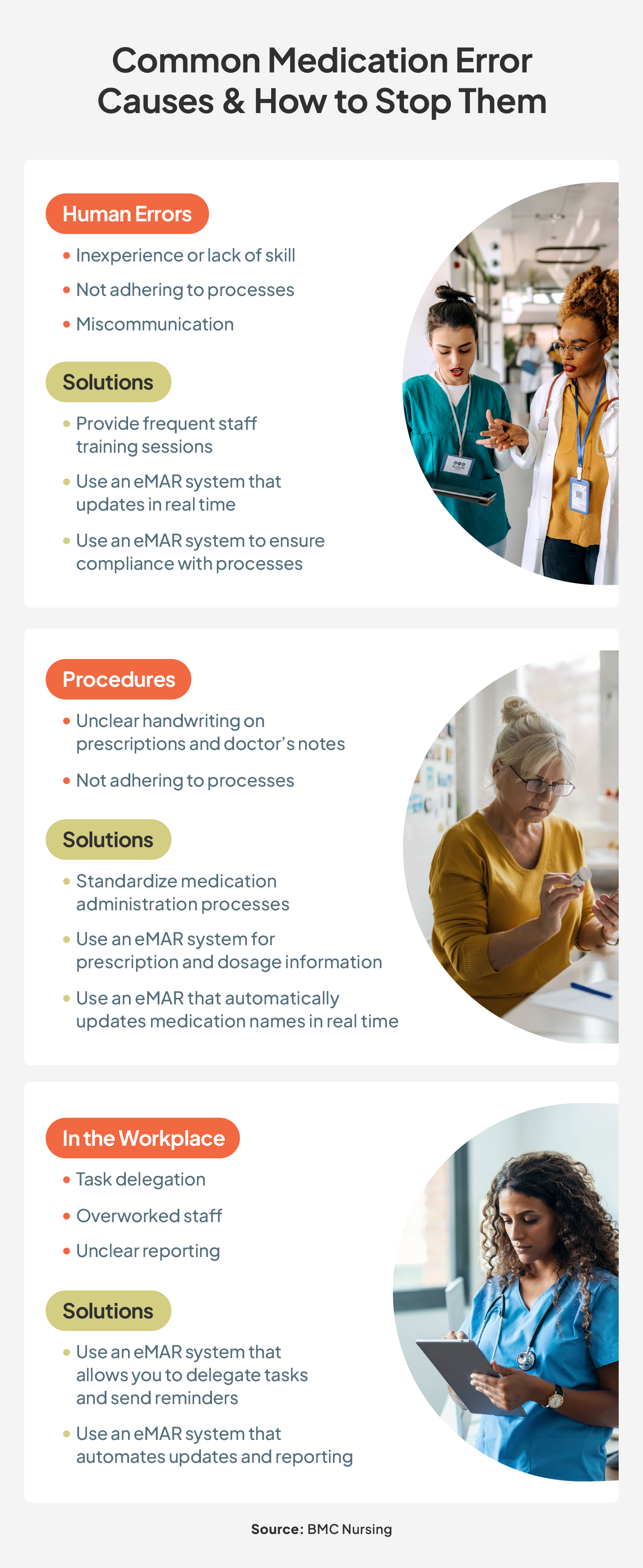Assisted Living Medication Management: 11 Strategies
Optimize medication management to boost resident safety.

Optimize medication management to boost resident safety.
Published on: June 21, 2024
Last updated: May 22, 2025

When managing senior living communities, operational efficiency is key — especially regarding medication management for a delicate resident population. Unfortunately, according to an American Geriatrics Society study, the medication error rate in senior living communities is 42%.
Medication errors can result in adverse events for your residents and present a liability and financial risk for your community.
In our work with more than 5,000 senior living communities, we’ve heard stories about medication management nightmares. We’ve gathered everything you need to know to protect your residents from medication errors, including 11 strategies for managing and administering medication with a powerful eMAR system.
Most senior living communities — except independent living — handle resident medication as part of their day-to-day operations management. This critical service helps patients control and improve their health by taking their medications as prescribed through a combination of medication management and medication administration.
Medication management refers to the high-level programs to oversee, track, and ensure medication is handled and prescribed safely. Part of medication management is medication administration, which is the practice of dispensing medications to residents.
State and federal governments have medication management and administration regulations that senior living communities must follow. Failure to comply with these regulations could result in fines and other penalties.
Effective medication management has several benefits for the owners and operators of a senior living community as well as its residents.

Fortunately, you can prevent many medication-related errors. Senior living operators should consider the following strategies to manage medication in their communities.
Increasing numbers of senior living owners and operators are turning to software to streamline medication management and administration in their communities. For example, Aline eMAR is considered one of the best assisted living software solutions, with automated med pass oversight that keeps your data safe while ensuring compliance with local regulations.

With so many residents taking different medications, your medication management process must be as simple as possible. By working with one pharmacy partner, you can eliminate any eMAR issues, minimize staff stress, decrease labor costs, and avoid medication errors.
Some pharmacy partners, such as PharMerica, even specialize in senior living, so you know they can handle your unique needs.
Adding compliance medication packaging, such as barcodes, can streamline dispensing, reduce errors, and automate record updates. This ensures your medication management system runs effectively, keeping your residents safe and your care staff happy.
A survey of senior living nurses in England revealed that inadequate staffing and inexperienced staff contribute to medication errors.
Frequent medication management training sessions can ensure you adequately prepare your care staff to manage medications to reduce errors. Even if you don’t have high staff turnover, regulations, evolving technologies, and care techniques necessitate training for every staff member.
You can’t get better if you can’t identify your problem areas, so regularly audit and review your medication management protocols. Aline eMAR features reporting capabilities that allow you to identify these problem areas easily. Use the results to implement new strategies and initiatives to resolve any issues.
Medication management goes above and beyond tracking who takes what medication and when. It’s also important to communicate with everyone involved — from your staff to your residents and their families.
Your staff should communicate any changes or concerns about medication to residents and their families. They should also be available to answer any questions or concerns.
Secure medication storage is essential to prevent administration errors or the loss of medication. Storage areas, whether cabinets or rooms, should be locked and limited to authorized staff only. Organize medications by type within the storage to avoid mix-ups. Audit these spaces regularly to identify and remove expired medications.
Standardize medication administration processes and guidelines across an entire community. You should always verify the resident’s identity, scan medications, and document administration to avoid errors.
Abiding by medication administration guidelines isn’t just on your staff — it’s also on your residents to comply with care staff.
Educate residents and their families on their medications and why they must take them as prescribed. Be supportive and encouraging, and work with them to eliminate potential barriers to taking their medications, such as difficulty swallowing pills or side effects.
Many eMAR software platforms allow you to program medication reminders when a medication is due, and you can run reports to track noncompliance, so you can identify patterns and resolve them.
Part of the move-in process for new residents should include a thorough review of their medications. Many seniors take multiple medications that different providers may have initially prescribed, so review their prescriptions for potential interactions.
This also gives you the chance to communicate medication needs to your pharmacy partner to get in front of any potential supply issues.

Learn more about medication management and what it means for assisted living communities.
Independent living communities do not offer medication administration and medication management since, by definition, the seniors who live in those communities live independently without medical support.
All other acuity levels — assisted living, skilled nursing, senior living care, and memory care — offer some level of medication administration and medication management.
Each state sets its own medication administration guidelines, which may change frequently. It’s important to monitor these to retain your license.
Medication administration and management protect your residents from medication-related errors, also known as adverse events. Depending on the nature of the error, these adverse events may include anything from withdrawal symptoms to hospital admittance and even death.
It is estimated that 800,000 preventable medication errors occur in long-term communities each year. Fortunately, another study found that 87% of medication errors did not result in any negative medical effects for residents.
Assisted living medication management isn’t just legally required — it can save a life by preventing medication errors that can send a resident to the hospital. Integrating a powerful eMAR system into your tech stack can benefit everyone at your senior living community, from your residents to care staff and the operations team.
Aline eMAR boasts a simple workflow, advanced pharmacy integrations, barcode scanning capabilities, chart alerts, narcotic inventory management, and more in an easy-to-use system. With our robust eMAR software, you can ensure compliance, support your staff, and improve pharmacy communication.
Book a demo today to discover how Aline eMAR can help you optimize and improve medication management in your senior living community, or download our our free resource “Your Comprehensive Guide to Choosing the Best Senior Living Software.” We’ll share how you can use Aline to deliver high-quality, personalized care for each resident at scale.


Amanda McGrory-Dixon
Amanda McGrory-Dixon is the content marketing manager at Aline, where she shares expert insights on how senior living communities can streamline operations, enhance resident satisfaction, and drive sustainable growth. With a deep understanding of industry trends and technology, she helps operators navigate challenges and implement data-driven strategies to improve efficiency, profitability, and care outcomes.
Blogs, stories and studies from the forefront of senior living operations

Lead generation surveys give senior living operators the data they need to understand their market, uncover new opportunities, and drive occupancy growth.

Prospect-centered selling helps senior living operators convert more leads and achieve occupancy goals through a more personalized, empathetic approach.

Gain insight into senior living pricing strategies for community success. Explore how Aline’s software optimizes revenue and operations

Overcome the biggest senior living financial challenges, including operational costs and occupancy rates, with interconnected software

Take a look at how senior living software options, like Aline, can elevate operations, resident care, and ROI

Enhance efficiency, accuracy, and resident satisfaction by integrating a POS system into your senior living dining operations
We’re using cookies on this site to improve your experience. Cookies help us learn how you interact with our website, and remember you when you come back so we can tailor it to your interests.
You can find out more about cookies and usage on our cookie policy page.
Some of these cookies are essential, while others help us to improve your experience by providing insights into how the site is being used.
For more detailed information on the cookies we use, please check our privacy policy
Your experience is important to us. We’re redirecting you to our new Aline website, where you’ll discover how our complete suite of senior living solutions can help you grow occupancy and revenue, optimize operations, and enhance resident care.
For more information, you’re welcome to read our statement on our merger. To continue your web experience, simply close this notification.
Your experience is important to us. We’re redirecting you to our new Aline website, where you’ll discover how our complete suite of senior living solutions can help you grow occupancy and revenue, optimize operations, and enhance resident care.
For more information, you’re welcome to read our statement on our merger. To continue your web experience, simply close this notification.
Your experience is important to us. We’re redirecting you to our new Aline website, where you’ll discover how our complete suite of senior living solutions can help you grow occupancy and revenue, optimize operations, and enhance resident care.
For more information, you’re welcome to read our statement on our merger. To continue your web experience, simply close this notification.
Your experience is important to us. We’re redirecting you to our new Aline website, where you’ll discover how our complete suite of senior living solutions can help you grow occupancy and revenue, optimize operations, and enhance resident care.
For more information, you’re welcome to read our statement on our merger. To continue your web experience, simply close this notification.
Aline Innovation Summit 2026: Registration Now Open!
Connect with senior living leaders, innovators, and industry peers May 11-13, 2026, in Frisco, TX to explore the latest innovations, proven strategies, and best practices shaping the future of senior living. View details and register today.